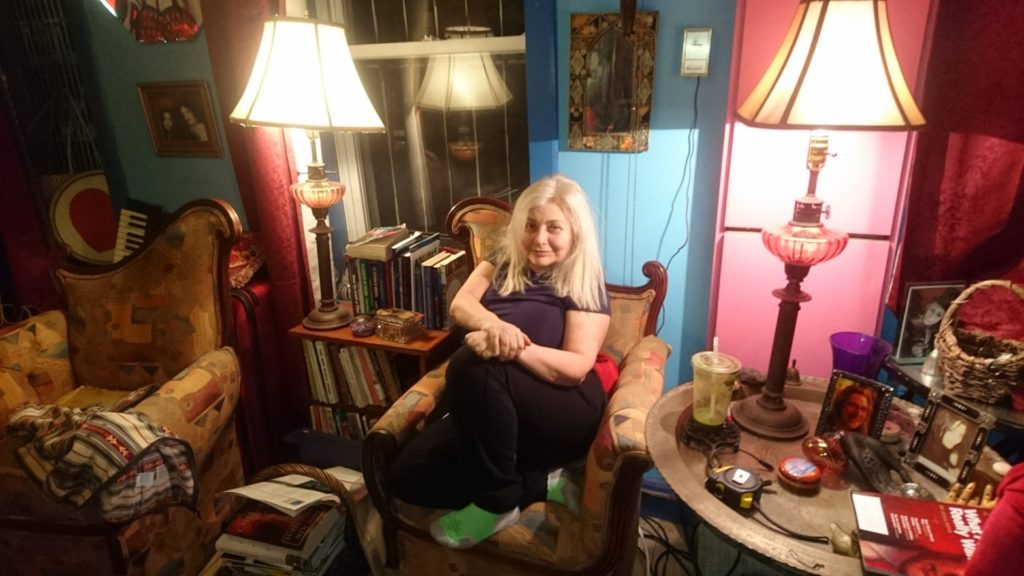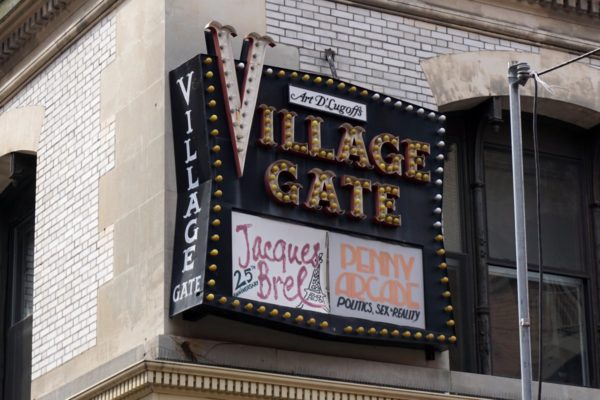
(c) Mathias Daval
At 68, the American performer is alive and kicking. After discovering her work in Prague last year at her witty and flamboyant one-woman show “Longing Lasts Longer”, we wanted to get to know Penny Arcade better. A few months later, on a cold January afternoon, we met at her Lower East Side apartment. The queen of punchlines gave us her views on New York and her fifty years of doing performance art.
MD
In “Longing Lasts Longer”, you make a distinguishing point between longing and nostalgia.
PA
The most important thing about nostalgia is that you’re nostalgic about who you were. And I don’t regret former versions of me… I’m the best me that I’ve ever been now! Someone was talking to me about reinvention, that an artist in order to keep working should always reinvent themselves. But I’ve never reinvented myself: I evolved. Evolution is continuation.
MD
Still, you seem to regret the evolution of New York City in the past two decades. How was it when you first got here?
PA
You know, I’m from a small town in Connecticut, from an immigrant Italian family. English was not my first language. I ended up running away from home when I was 13. I arrived in New York in 1967. I’m actually working on a new show that is all about that particular year.
MD
The first year of the rest of your life…
PA
I remember getting off a taxi in the Village, at the corner of Thompson and Bleecker. If you were to walk over there right now, there’s a landmark sign that says: “Jacques Brel is alive and well and living in Paris”, and on the other side “Penny Arcade, sex, politics, and reality”. It’s been up there since 1982. That corner is also where my father’s two brothers lived, but at that time I didn’t know that because we never were in touch with that side of the family…
MD
So you didn’t really know anyone when you arrived in New York?
PA
Not really. I had met these hippies from California, and they invited me to go along with them to the Electric Circus [a trendy East Village nightclub from the late sixties to the early seventies]. One day, Sly and the Family Stone was playing. Somehow Wavy Gravy put me on stage to dance. I saw Sly looking at me with hatred; he didn’t think it was cute. (laughs) So I had to do what was probably the first stage dive in history! This old painter told me then “You should do theatre”. “That’s exactly what I’m doing”, I answered.
MD
What a start!
PA
And shortly after that, I met John Vacarro from the Playhouse of the Ridiculous, which was the original experimental glitter-glam-rock’n’roll-political theatre of the sixties in New York, that influenced everything from punk to the “Rocky Horror” and “Hair”. So I’ve been doing avant-garde rock’n’roll theatre since then!
MD
And you soon joined the Andy Warhol gang. How was it being around those mythical people?
PA
Andy Warhol was by far not the most interesting person there. He was of course very smart, but he was also somebody who didn’t talk. (laughs) I recognized him as a working-class person though. I come from a factory town, and I grew up with people who looked like Andrew. But whenever I tried to talk to him about that world, he was mortified because he tried to escape that. And I’m seen as a working-class intellectual, which is despised more than anything else here. The world doesn’t recognize that even among the poorest people, there’s an intelligentsia. I’m also seen in New York as being anti-academic, but I’m not anti-academic, I’m non-academic!
MD
A true Lennon-style working class hero…
PA
I grew up in this underground, criminal, homosexual, artistic scene in New York. Jack Smith, John Vacarro, Danny Fields, Donald Lyons… They were all exceptional intellects. I was surrounded by giants who were 20 to 30 years older than me, and there are very few of them left… It took at least till I was 50 for me to feel like I wasn’t at their knee. But I respected them so much. Their generation invented everything.
MD
Did you consider yourself an artist at that time?
PA
At 20, it didn’t matter that I had absolutely no self-confidence that I would ever become an artist because I had no background or education. I had the benefit of those extraordinary people’s points of view. I didn’t start making my own work up until the eighties, so I had a very long apprenticeship!
MD
Most of your shows are about New York and gentrification. Is it a love-hate story between you two?
PA
Gentrification has always been a huge theme in my work since 1981. As I used to say, the city went from being the Big Apple to the Big Cupcake. The truth is people aren’t really interested in art anymore. They’re interested in restaurants, in cocktails. The music scene was phenomenal. Within ten years it was completely stripped. I have always lived in the Lower East Side, and it’s a perfect example of gentrification. It used to be an anarchist stronghold, and wealthy people have taken everything over, it’s been colonized. Because of the real estate prices, a lot of places that were music clubs or performances spaces can no longer exist. There was a real destruction of an intact Bohemia that was here. I did housing activism at a time when the city was attacking all the squats. The great urban beast has been slain. Everything now is a macaroon or a soap shop. You can’t find what you need for your everyday life. And we have no fucking bookstores! You go to Paris and there are bookstores everywhere.
MD
The same phenomenon is happening in Paris. And it’s a rather bleak view of New York’s present and future…
PA
Yes, but I feel like I’m an optimistic person because I’m an anarchist, and anarchists believe things can change, right? Although I don’t know how it’s gonna happen because the people are in a deep sleep. I don’t believe that you can change the world, but you can change the world around yourself. But when you’re confronted with this golden age of stupidity… People have the attention span of a Twitter tweet.
MD
Is it getting worse now in this post-Trump election era?
PA
I’m not involved at all with all the whole Trump and all of that… To me, it’s a complete joke. As soon as it became clear that he was in the running for the presidency, I abdicated. This is a coup, and I can’t do anything about this. But I watched the entire society degenerate. It’s quite fascinating. The end of Western civilization… It goes out with a fart, not with a bang! America is in a civil war now.
MD
Between who and who?
PA
Between people who can think and people who refuse to think. I’m telling you, it is staggering. They are dark periods in history and I think we’re in one of them. If you’re interested in art or in ideas, you’re the one percent! In 1990, every performance space in New York was still filled with young people. That was what was in, and it’s no longer the case. People are not reading anymore. They feel isolated, alienated.
MD
Yet your shows are not cynical. You manage to maintain a very genuine way of telling stories.
PA
We’re living in a culture where everything is sarcastic. Yeah, it’s like we don’t really care about anything, we’re not affected… Well, I care a lot! I could never watch David Letterman and all those shows. It’s so depressing. I watch five minutes of that and I want to kill myself. I’m frequently confused by how I ended up becoming this performer. I don’t really have the stomach for it, you know? And because performers usually have this specific agenda, and I just want to be free, and other people to be free also…
MD
So tell us about the development of your last show. How did it start?
PA
All my work is developed in front of a live audience. It’s really exactly how I performed in the sixties. I’m still doing what I was doing when I was 17, only I got really good at it. (laughs) With Steve [Zehentner] – who came to work for me originally in 1991, shooting videos, then basically became my dramaturg – we started creating the material last summer, and now we have over 115 scripts. That’s how many times the show has changed! We wanted to streamline the show down to its essential message.
MD
How many times have you performed “Longing Lasts Longer”?
PA
About 200 representations in 35 cities and 12 countries. I’ve been asked to turn LLL into a book.
MD
Do you ever write fiction?
PA
All my characters are based on people that I knew. Everything I say on stage is true. It’s hard to even entertain fiction when real life’s so bizarre and compelling. I make work for smart people, not for educated people. It’s high content entertainment!
MD
The audience in Prague seemed to really enjoy your performance, despite being non-native English speakers.
PA
What it really became was a content provider for young people, and a vindication for old people. Because in the culture that we’re living right now, people who are over fifty really feel like pushed to the side. What’s interesting in life is to put yourself on other people’s streets, as Patti Smith once told me. That’s what I’m trying to do. Marianne Faithfull, who I visit often in Paris, wrote in her last book “My pal Penny Arcade can fix anything.” I am the problem solver! (laughs) I will go to court, raise the money, or whatever is needed. I have the real connection to my community. My basic agreement with the universe is that I will never turn away anybody who comes to me for help. My nature is ill-suited for the very competitive world of art.
MD
I think your audience likes seeing and hearing a badass woman on stage.
PA
Ha, ha! Someone once told me that I was an angry young man in a middle-aged woman body. People who dislike me dislike my values… The political correctness is now in the drinking water, and it doesn’t belong to any particular group. It’s just everywhere.
MD
Do you have a favorite restaurant in New York?
PA
That’s one problem, is that every time you turn around, a place closed. But I would say Gaia, in Houston St between Suffolk and Norfolk. It’s a small restaurant, and it really is an experience to go there. The owner makes beautiful Italian food that is not expensive, very much in the spirit of the Lower East Side. But to be honest, I usually prefer to eat at home.
MD
Is there one thing you stopped being obsessed with?
PA
Politics. Fuck them. Let them die.
MD
One book that you would take with you if you were stranded on an island?
PA
“The Little Prince”.
MD
One writer dead or alive you wish you had the opportunity to meet?
PA
Graham Greene.
MD
And where would you live if not in New York?
PA
I would adore living in Paris. And I still love the Baleares Islands… But you know, as many rants I have against New York today, I must say that the energy is still here. It’s under your feet. Walt Whitman said it, you walk in the streets and you can feel it. When I was young, I didn’t really believe that I could become an artist, but I believed I could live an artistic life. And that’s what I’ve chosen. They are many artists who would never live an artistic life. That’s what downtown New York was all about, choosing to have art in the center of your life.

(c) Mathias Daval
